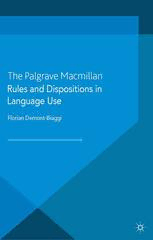
Rules and Dispositions in Language Use PDF
Preview Rules and Dispositions in Language Use
Rules and Dispositions in Language Use This page is intentionally left blank Rules and Dispositions in Language Use Florian Demont-Biaggi Military Academy at ETH Zurich © Florian Demont-Biaggi 2014 Softcover reprint of the hardcover 1st edition 2014 978-1-137-35859-2 All rights reserved. No reproduction, copy or transmission of this publication may be made without written permission. No portion of this publication may be reproduced, copied or transmitted save with written permission or in accordance with the provisions of the Copyright, Designs and Patents Act 1988, or under the terms of any licence permitting limited copying issued by the Copyright Licensing Agency, Saffron House, 6–10 Kirby Street, London EC1N 8TS. Any person who does any unauthorized act in relation to this publication may be liable to criminal prosecution and civil claims for damages. The author has asserted his right to be identified as the author of this work in accordance with the Copyright, Designs and Patents Act 1988. First published 2014 by PALGRAVE MACMILLAN Palgrave Macmillan in the UK is an imprint of Macmillan Publishers Limited, registered in England, company number 785998, of Houndmills, Basingstoke, Hampshire RG21 6XS. Palgrave Macmillan in the US is a division of St Martin’s Press LLC, 175 Fifth Avenue, New York, NY 10010. Palgrave Macmillan is the global academic imprint of the above companies and has companies and representatives throughout the world. Palgrave® and Macmillan® are registered trademarks in the United States, the United Kingdom, Europe and other countries. ISBN 978-1-349-47125-6 ISBN 978-1-137-35860-8 (eBook) DOI 10.1057/9781137358608 This book is printed on paper suitable for recycling and made from fully managed and sustained forest sources. Logging, pulping and manufacturing processes are expected to conform to the environmental regulations of the country of origin. A catalogue record for this book is available from the British Library. A catalog record for this book is available from the Library of Congress. To my wife, my parents and my sisters This page is intentionally left blank Contents Acknowledgements i x Introduction 1 Part I Language Use and Rule-Following 1 Kripke’s Wittgenstein 5 1.1 The sceptical scenario 7 1.2 The sceptical solution 26 1.3 Objectivity 35 2 The Rule-Following Debate 40 2.1 Wittgensteinian views 41 2.2 Varieties of realism 59 Part II The Objective Grounds of Language Use 3 Objective Grounds 7 7 4 Dummett on Realism and Antirealism 87 4.1 Language, truth and meaning 88 4.2 The truth-conditional conception of meaning and understanding 91 4.3 Dummettian verificationism: intuitionism besieges theories of meaning 98 4.4 Falsificationism as an alternative? 103 4.5 Meaning, realism and antirealism 109 4.6 Miller on truth-conditions and reality 113 4.7 Basic statements 121 5 Basic Statements and Epistemic Rules 126 5.1 Analyticity returns 126 5.2 Objections and extensions 131 5.3 The problem: transmitting justification in deductive reasoning 134 5.4 Blind reasoning: inferences built into concepts? 141 5.5 Entitlement by proof, truth and common ground 145 5.6 And now? 148 vii viii Contents Part III Linguistic Powers and Their Proper Study 6 Linguistic Powers 1 53 6.1 Knowledge of language 154 6.2 From knowledge to competence 161 6.3 The Chomskian perspective 165 6.4 Baker and Hacker on Chomsky 172 6.5 Methodological naturalism and internalism 180 6.6 Chomsky’s methodological naturalism 181 6.7 Chomsky and the mereological fallacy 188 7 Logic and Language 198 7.1 Medieval logicians on logical form and grammatical form 201 7.2 F rege’s innovations and the separation of logical form from grammatical form 203 7.3 H ow Russellian descriptions suggest a separation of logical form from grammatical form 209 7.4 An alternative notation 211 7.5 The alleged affinity between grammar and logic 214 7.6 Pietroski’s Davidsonian suggestion 219 7.7 A Wittgensteinian perspective 224 Glossary 2 28 Notes 2 31 Bibliography 2 39 Index 2 45 Acknowledgements I am very happy that Marceline Schmid-Berlinger has suggested that I use her Verbindungen I for the cover of the book, because I strongly feel that her motivation for painting V erbindungen I and my motivation for writing the present book are related. Anne-Kathrin Schlegel, Florian Wüstholz and Sebastian Wyss have read parts of earlier versions and provided helpful comments. Hanoch Ben-Yami has read an earlier manuscript and pointed out some impor- tant mistakes. I am much indebted to Hans-Johann Glock who has read most drafts I produced and who has relentlessly drawn my attention to mistakes and unclear passages. His efforts have helped me to sharpen my thinking and my writing. All remaining mistakes are, of course, due to my own shortcomings. ix
